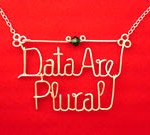OK. I admit it. I’m a grammar geek.
As a writer and an editor, it drives me to the brink when people use apostrophes to form plurals of acronyms, e.g., PC’s instead of PCs.
And don’t even get me started about agreement. For example, it’s not “the woman took their dog to the vet.” It’s ‘the woman took her dog to the vet.” When I see this, “the company wants to take their stock public” instead of  “the company wants to take its stock public,” I want to scream.
“the company wants to take its stock public,” I want to scream.
But even though I try to get it right all the time, there are some language rules that still trip me up, like whether to use a singular or plural verb with certain collective nouns. For instance, is it: “The team is going to the banquet,” or “The team are going to the banquet?” In this case, team is being used as a cohesive unit so a singular verb is required.
All of this brings me (finally) to the subject of this post. Which is correct, “data is” or “data are”?
This is a question I ponder on numerous occasions. And I was ecstatic to realize I wasn’t the only person to be befuddled by this problem.
According to the Grammarist, when it comes to data, you just can’t win. If you use it as a singular noun—e.g., “this data is,” you might lose credibility with some readers. When you use it as a plural noun—e.g., “these data are,” it will most likely sound strange to your readers who are used to hearing data as a singular noun.
So, the Grammarist asks, “Should we use data as singular or plural?” It all comes down to preference and maybe using one that sounds best. “But if you want to be safe, treat data as plural in scientific and academic contexts,” the Grammarist says.
The esteemed Wall Street Journal has even made its preference known.
Recently the venerable Journal made a change in the way it uses the word “data” and it even devotes a blog to explaining its decision to its readers.
“Most style guides and dictionaries have come to accept the use of the noun data with either singular or plural verbs, and we hereby join the majority,” according to the blog. “Otherwise, generally continue to use the plural: Data are still being collected.”
The Journal’s “style guru,” Paul Martin recommends substituting the word “statistics” for data. It doesn’t work in this case – “little statistics is available.” However, it does work in this case – “statistics are still being collected.” So the plural is correct. Add to that the fact that the word “data “is the Latin plural of datum – and the choice seems like an easy one.
Martin says you should generally continue to use the plural: Data are still being collected.
However, news publications vary in the ways they use the word “data.”
Here are some examples:
- Japan Economic Data Worsen [Wall Street Journal]
- Data are still being analyzed but will be ready to present at the conference. [Denver Post]
- GDP Data Shows Japan’s Economic Growth Slowing [LA Times]
- Obama’s campaign staff members said that all that data is not gathered to shape the message. [Washington Post]
- Money data are not everything . . . [Telegraph]
Even the language police at Wake Forrest University have something to add to the debate.
According to the language police, the word data is plural, like the word people, and that means you can’t say, “That satellite tracking data is nice.” But you can and should say, “That satellite tracking datum is nice,” if you’re referring to just one piece of information, because datum is singular, like person is singular.
“If you use the word data correctly, you will be one up on people like network newscasters, Presidents of the United States, and just about everyone else, who think the word data is singular,” according to Wake Forest’s language police. “On the other hand, if you use it incorrectly, probably no one will notice.”
Next Steps:
- Subscribe to our blog to stay up to date on the latest insights and trends in data analytics and big data.
- To hear how organizations that have adopted in-memory computing can analyze larger amounts of data in less time – and much faster – than their competitors, watch our on-demand webcast, “In-Memory Computing: Lifting the Burden of Big Data,” presented by Nathaniel Rowe, Research Analyst, Aberdeen Group and Michael O’Connell, PhD, Sr. Director, Analytics, TIBCO Spotfire.
- Download a copy of the Aberdeen In-Memory Big Data whitepaper here.
Spotfire Blogger





